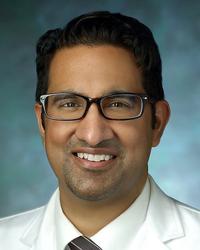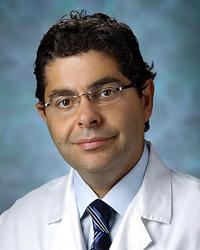Research Lab Results
-
Neuro-Oncology Surgical Outcomes Laboratory
Directed by Debraj “Raj” Mukherjee, MD, MPH, the laboratory focuses on improving access to care, reducing disparities, maximizing surgical outcomes, and optimizing quality of life for patients with brain and skull base tumors.
The laboratory achieves these aims by creating and analyzing institutional and national databases, developing and validating novel patient-centered quality of life instruments, leveraging machine learning and artificial intelligence platforms to risk-stratify vulnerable patient populations, and designing novel surgical trials to push the boundaries of neurosurgical innovation.
Our research also investigates novel approaches to improve neurosurgical medical education including studying the utility of video-based surgical coaching and the design of new operative instrumentation.
-
Spinal Column Surgical Outcomes Lab
The Spinal Column Surgical Outcomes Laboratory aims to improve the neurological outcomes and functional capacity of patients undergoing spinal surgery. We collect large-scale retrospective patient databases and prospective patient registries to report high-quality data relating to the outcomes of neurosurgical operations. The laboratory participates in the National neurosurgical Quality and Outcomes Database (N2QOD). This multi-institutional collaboration has set forth a 3-year prospective study to benchmark quality and surgical outcome measures across several academic institutions. The Spinal Column Surgical Outcomes Laboratory specializes in biostatistical analysis of large-scale clinical databases, studying the outcomes of traditional and novel spinal procedures, quality control and cost-effectiveness research and clinical trials relating to spinal surgery outcomes. -
Charles Hugh Brown Lab
The Charles Hugh Brown Lab researches cognitive dysfunction, with a focus on quality of care and outcomes regarding perioperative management of older patients. Our studies explore post-operative delirium, cognitive changes and transfusion practices. We also have a longstanding interest in cerebral autoregulation and its role in post-surgical outcomes.
-
Nauder Faraday Lab
The Nauder Faraday Lab investigates topics within perioperative genetic and molecular medicine. We explore thrombotic, bleeding and infectious surgical complications. Our goal is to uncover the molecular determinants of outcome in surgical patients, which will enable surgeons to better personalize a patient’s care in the perioperative period. Our team is funded by the National Institutes of Health to research platelet phenotypes, the pharmacogenomics of antiplatelet agents for preventing cardiovascular disease, and the genotypic determinants of aspirin response in high-risk families. -
The Boss Lab
The Boss Lab's research focus is on patient experience, health disparities, and surgical outcomes and utilization. Studies include shared decision-making, communication, and patient/parent-reported outcomes for elective surgery in children; patient satisfaction metrics, outcomes, and health correlates in surgery and pediatrics; patient and family-centered care and communication in surgery and pediatrics; racial, ethnic, and socioeconomic disparities in pediatric surgical care utilization and outcomes; and quality and safety in pediatric surgical care



